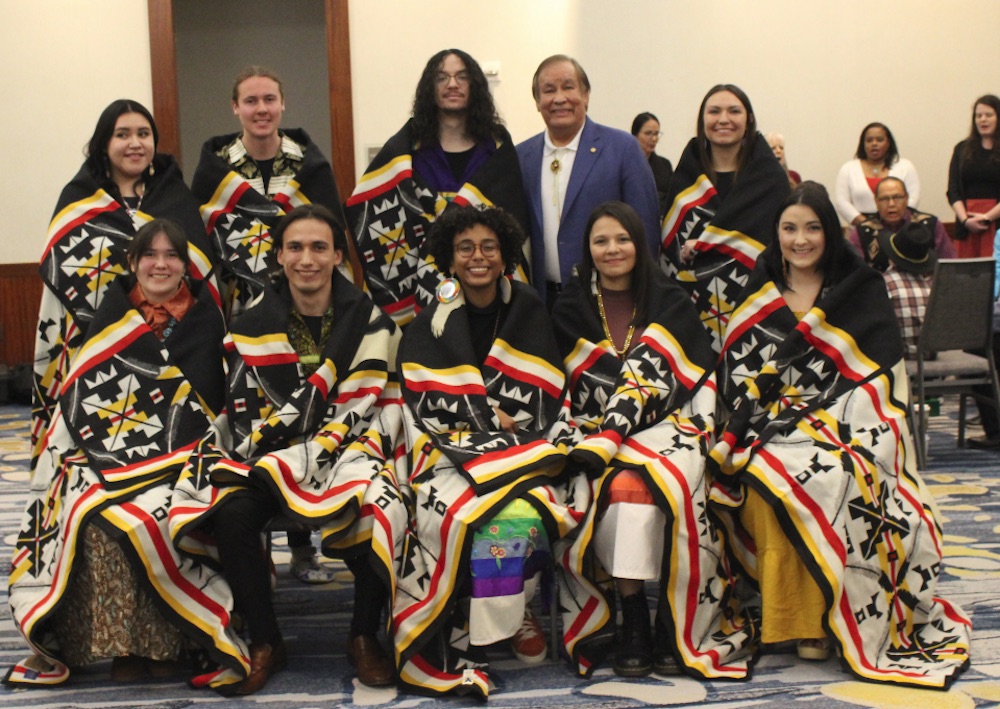
- Details
- By Levi Rickert
Opinion. Olympic great Billy Mills (Lakota) believes dreams can come true.
His dream certainly came true when he crossed the finish line of the 10,000-meter race at the 1964 Olympic Games in Tokyo to win a gold medal. Not expected to win, he shocked the world when he came from behind to take first place.
Crossing the finish line and winning gold were longtime dreams for Billy. Seeing it come true changed his life forever.
But it changed more than Billy’s life. That moment propelled him to change the lives of thousands of other Native Americans in Indian Country, as well. In the ensuing years, he became a businessman and a national spokesperson on Native issues.
In 1986, he started a non-profit organization called Running Strong for American Indian Youth. He joined forces with Eugene Krizek, founder of Christian Relief Services. Since then, the organization has raised millions of dollars to help provide basic needs for poor Native Americans. Running Strong helped to feed, provide heat, and educate young Indigenous people.
Initially, the nonprofit concentrated on helping Native Americans on the Pine Ridge Indian Reservation where he was born. Soon, the organization was assisting on the nearby Cheyenne River Indian Reservation and eventually to some 30 tribal communities in Indian Country.
In 2014, on the 50th anniversary of his gold medal run, Running Strong began the Dreamstarter program based on Billy’s belief dreams do come true.
Since then, the Dreamstarter program has provided funding to 80 Native American youths to help them turn their dreams into reality. Each year, applicants have to pitch their dreams that they want to turn into projects that change the lives in tribal communities. A committee selects 10 participants and provides them with funds to turn their dreams into reality.
Through the years, the amount of money given to each Dreamstarter was $10,000. This year, that number grew. The 2023 recipients each received $20,000 to fund their projects.
A strong aspect of the Dreamstarter program is that Running Strong does not simply send recipients a check and ask them to send a year-end report. The participants are brought into Alexandria, Virginia to attend the Dreamstarter Academy, which is a five-day training program filled with learning, social activities and workshops.
I covered this year’s Dreamstarter Academy two weeks ago. It was a treat to me to see nine Native youth (one was unable to attend due to Covid-19) and their mentors come together to share their dreams.
At the academy orientation, Running Strong’s executive director Sydney Mills Farhang (Lakota), Billy Mills’ granddaughter, inspired the participants to share their dreams with others and not be afraid to ask for assistance.
During the next three days, the Dreamstarters worked on sharpening their dreams so that their projects can be successful and impactful. The participants were given video cameras and taught how to use them so that they can record their progress.
On the final evening of the four-day academy, Billy told the 2023 class of Dreamstarters his poignant personal story of being wounded and in pain after the loss of his mother when he was only 8.
His father, who would die four years later, gave him some life-changing advice: “You need a dream to fix broken wings. Find your dreams son. It is the pursuit of your dreams that will heal you. If you do this you may have wings of an eagle.”
When he was only 12, Billy lost his father. Orphaned, he felt lost and alone, but he remembered his father’s advice about what it takes to heal wounded wings. Being a fast runner, he took his father’s advice and dreamed of winning a gold medal. The dream propelled him into greatness when he crossed the finish line in the 1964 Olympics.
Last week in Virginia, Billy urged the new cohort of Dreamstarters to follow their dreams as they concentrate on environmental justice-inspired projects.
One dreamer wants to train Native youths to use drones to capture photographs of damage on Indian reservations so that the preliminary findings can be sent to FEMA for faster restoration. Other dreamers want to begin tribal community gardens to stress the importance of Indigenous food sovereignty. Still others are planning conferences to engage Native youth to take better care of Mother Earth.
Besides being able to spend time with Billy and his wife of 61 years, Pat Mills, I was inspired by the enthusiasm and excitement of nine Native youth who are intelligent, well-informed, and dreamers.
In the upcoming weeks, I will write more about the individual projects of the dreamers.
Thayék gde nwéndëmen - We are all related.
More Stories Like This
Extending the Affordable Care Act Is a Moral Imperative for Indian CountryAll Is Fair in … War?
Why Federal Health Insurance Policy Matters to Cherokee Nation
The Absence of October's Job Report Shows Why Native American Communities Need Better Data
Tribal IDs Are Federally Recognized. ICE Agents Are Ignoring Them.
Help us defend tribal sovereignty.
At Native News Online, our mission is rooted in telling the stories that strengthen sovereignty and uplift Indigenous voices — not just at year’s end, but every single day.
Because of your generosity last year, we were able to keep our reporters on the ground in tribal communities, at national gatherings and in the halls of Congress — covering the issues that matter most to Indian Country: sovereignty, culture, education, health and economic opportunity.
That support sustained us through a tough year in 2025. Now, as we look to the year ahead, we need your help right now to ensure warrior journalism remains strong — reporting that defends tribal sovereignty, amplifies Native truth, and holds power accountable.
 The stakes couldn't be higher. Your support keeps Native voices heard, Native stories told and Native sovereignty defended.
The stakes couldn't be higher. Your support keeps Native voices heard, Native stories told and Native sovereignty defended.
Stand with Warrior Journalism today.
Levi Rickert (Potawatomi), Editor & Publisher

